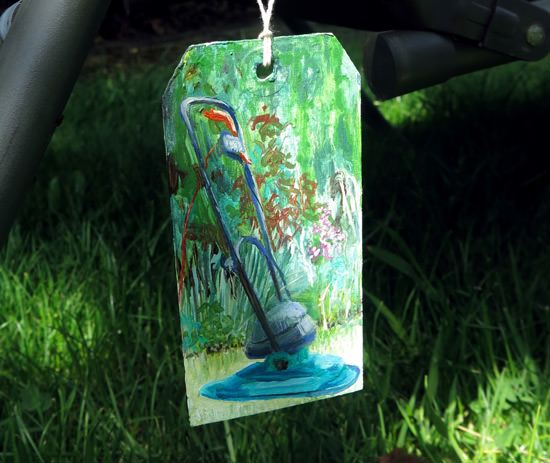
Tags @ Cairnhill Open Gardens event June 2015

I will be exhibiting at the Cairnhill Open Gardens event from June 2015.


I will be exhibiting at the Cairnhill Open Gardens event from June 2015.
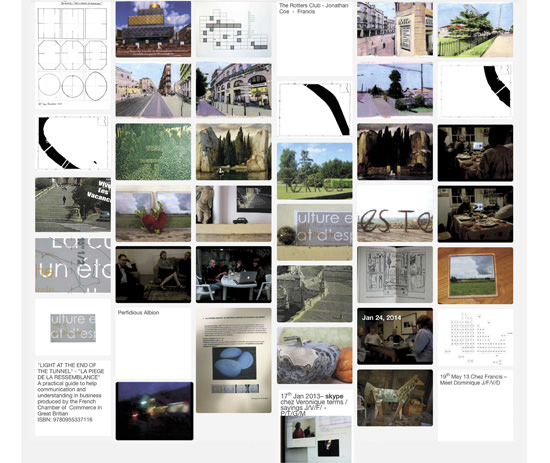
I will be exhibiting at the Dialogue Exhibition at Rugby Art Gallery and Museum from 6th September to 18th September 2014.
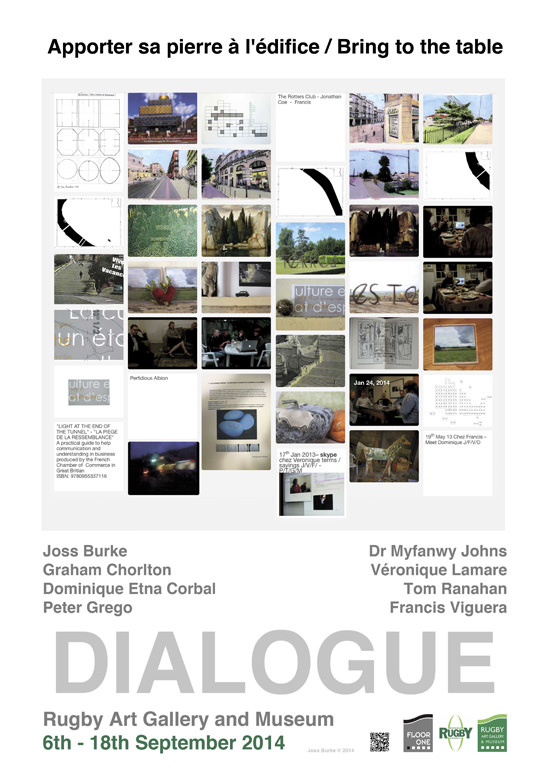
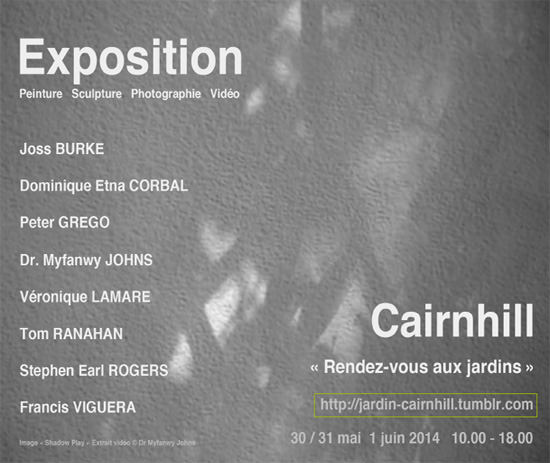
I will be exhibiting at the Cairnhill Open gardens event in France from 30th May to 1st June 2014. The event features the first showing of the film ‘Shadow Wall’.

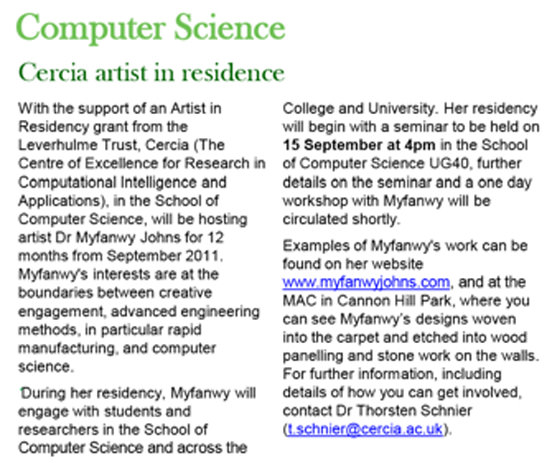

In September 2011 I will start a ten-month Artist in Residence funded by the Leverhulme Trust. The residency is hosted by CERCIA, The Centre of Excellence for Research in Computational Intelligence and Applications (Dr Thorsten Schnier), at the School of Computer Science, University of Birmingham.
I will be investigating the function of ornament and its transformative quality on architectural space. An ongoing interest of my practice is to investigate interior and exterior architectural structures that initiate a public interface with ornamentation in the built environment. Particular interests include the expression of materials and integrating pattern into essential substrates. My explorations of surface design include working with historic pattern; pattern enables my work to connect with previous and future generations. My research interests include the application of computer image transfer technology to new and traditional materials to integrate decoration into the structure.
The aim of the Residency is to research the boundaries between creative engagement, advanced engineering methods and computer science to create unique outcomes that have the potential to advance thinking towards use of ornamentation. My PhD research led to the investigation of digital image transfer techniques and its significance to the function of ornamentation in architecture. It is this individuality of outcome that interests me, computers and digital manufacturing enable mass customisation as opposed to mass production. A common interest with the computer science department is the creation, variation and use of patterns in a range of contexts. The host has in the past explored the computational formulation and parameterization of patterns, and I have explored repetition of forms and their decorative applications. The mathematical formulation of patterns found in nature, historic artifacts, environmental data, and other sources, and their use in decorative art, will therefore form one focus of the collaborative work. Patterns also play an important role in human computer interaction (HCI) and software design; we will look at exploiting some of the implicit knowledge embodied in design practice.
I plan to work closely with the Visual and Spatial Technology Centre (VISTA) and the Interdisciplinary Research Centre (IRC) in Metallurgy and Materials Processing. Visual experimentation is likely to use the potential for 3D scanning and direct laser fabrication technologies to create unique surface ornamentation and 3-D sculptural objects. The direct laser fabrication technique can produce 3-D components directly from CAD files using a laser beam, which moves following the paths defined by the CAD file whilst metal or ceramic powder is being injected into its focal point.
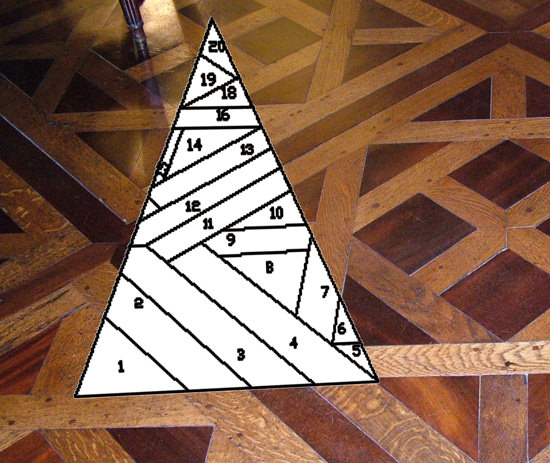

Joss Burke, Graham Chorlton, Peter Grego, Dr Myfanwy Johns and Tom Ranahan have been invited to exhibit in the 2010 Art Chartrons Festival. ‘Dialogue’ will consist of newly commissioned work in response to the city of Bordeaux. Each artist will forge an independent dialogue with the city that observes decorative detailing in the architecture, the passage of time, change of use of buildings and social interaction with the built environment. The work produced will take the form of sculpture, painting, print, photography and installation.
Art Chartrons is an association that was created in 2007. It combines independent studios, alternative exhibition spaces and galleries in the Chartrons district of Bordeaux. The Mayor of Bordeaux supports the association whose current president is Francis Viguera. For more information about past exhibitions and future events please visit http://www.arts-chartrons.info/
Dialogue is funded by the Arts Council England, Arts Chartrons, Oxford Brookes University, Coventry University and Birmingham City University.
‘Floating floor’ 2010 is a perfectly crafted installation exploiting the natural characteristics of wood. It plays on the perspective, scale and pattern of traditional parquet, creating a human, interactive and tactile connection to architectural surface and history.
My explorations of surface design often include working with historic pattern; pattern enables my work to connect with previous and future generations. The geometry of form is also important both as modular surface and structural object. The installation creates a dialogue with the venue and sits within one of the triangular sections of the octagonal Halles des Chartrons. The triangular format is both a site-specific and universal geometric form.
The installation pays homage to the exquisite flooring found in the Hotel Lalande, now known as the Museum of Decorative Arts in Bordeaux.
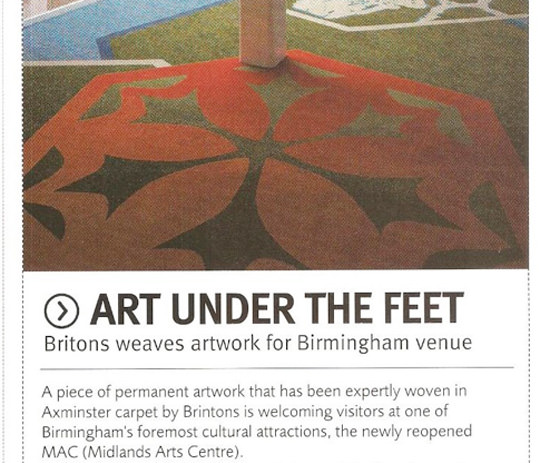
A piece of permanent artwork that has been expertly woven in Axminster carpet by Brintons is welcoming visitors at one Birminghams foremost cultural attractions, the newly reopened MAC (Midlands Art Centre).
Birmingham artist Dr Myfanwy Johns and the female members of the Bosnian Cultural Centre – Midlands worked together to develop a peice of permanent artwork that would complement the theme and shape of the refurbished MAC building. Their design, featuring the bold and dramatic shapes associated with traditional Bosnian arts and crafts, took more than 12 months to develop and was digitally customised by Brintons to ensure it would be durable and suitable for weaving in carpet.
Brintons has also supplied and installed 175,000 sq m (the equivalent to 24 footabll pitches) of Axminster carpet in the new Terminal 3 building at Indira Gandhi International Airport in Delhi.